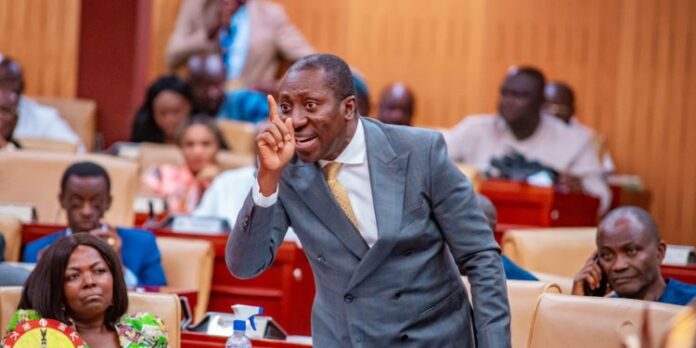The Minority in Parliament has strongly criticised the Mahama administration’s flagship 24-hour economy policy, describing it as a propaganda initiative designed to mislead Ghanaians.
The 24-hour economy policy was officially launched by the Mahama government on July 2, with the stated goal of boosting productivity, creating jobs, and stimulating inclusive economic growth by promoting round-the-clock operations in key sectors.
However, the Minority contends that the policy is unfeasible under the current economic climate and lacks a clear implementation framework.
Speaking on the floor of Parliament on Thursday, July 3, Minority Leader, Alexander Afenyo-Markin argued that the policy lacks substance and was introduced amidst worsening economic conditions.
According to Afenyo-Markin, the policy will not yield any meaningful benefits for the Ghanaian public.
“Their so-called 24-hour economy, on Wednesday, July 2, they launched it without due regard to Parliament. We in the Minority see this as a mere public relations tool to distract from real-time economic hardships and win public goodwill. Because you just increased tariffs, you have introduced a levy which the people called ‘Dumsor’ Levy,” he criticised.
Meanwhile, Special Advisor on the 24-Hour Economy, Goosie Tanoh, says the newly launched policy initiative is open to public scrutiny and evolving input, describing criticism as vital to its success.
He made the point on Wednesday, July 2, at the official launch of the programme. Mr. Tanoh said the 24-Hour Economy is a dynamic, science-driven initiative rooted in social democratic values, and designed to adapt to the needs of a changing national environment.
“We at the secretariat are confident that we will continue to receive constructive criticism and suggestions for further improvement. Criticism is always welcome. We see the 24-hour programme as a living programme, enriched in science and firm social democratic principles, but flexible enough to respond tactically to a changing environment,” he said.
He noted that the initiative’s long-term success will depend on continuous learning, flexibility, and the willingness to revise strategies based on feedback and evolving circumstances.
“This is the only way a programme can transform our society in the short, medium, and long term,” Mr. Tanoh added.
The 24-Hour Economy initiative seeks to unlock Ghana’s productivity potential by promoting round-the-clock business activity, increasing employment, and ensuring more efficient use of national infrastructure and resources across sectors. The programme is expected to create a robust platform for job creation, industrial expansion, and economic resilience.

